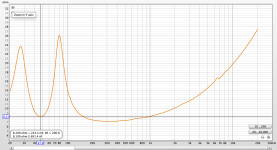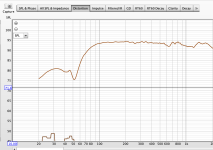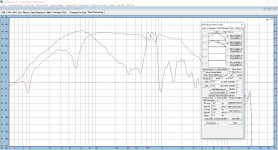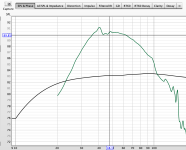Hey everyone.. I'm working on my 1st set of speakers. They are a set of bookshelves using the RS180-8.
The enclosures are about 12.5L and I put a 5.1cm port that's 18cm long. This should give me a Fb of around 47Hz. Based on WinISD this should result in a F3 or around 47dB.
On the impedance chart, it looks like the box is tuned to around 47Hz (assuming I'm reading it right), so that seems right. But when I do a near field measurement of the woofer on axis, the F3 seems more like 76Hz.
When I listen to music, it sounds like it has lots of bass, so I'm trying to understand if this is a measurement issue, or a real issue. If it's a real issue, what causes the early rolloff like that? Should I try to adjust the port to compensate?
Thanks.
The enclosures are about 12.5L and I put a 5.1cm port that's 18cm long. This should give me a Fb of around 47Hz. Based on WinISD this should result in a F3 or around 47dB.
On the impedance chart, it looks like the box is tuned to around 47Hz (assuming I'm reading it right), so that seems right. But when I do a near field measurement of the woofer on axis, the F3 seems more like 76Hz.
When I listen to music, it sounds like it has lots of bass, so I'm trying to understand if this is a measurement issue, or a real issue. If it's a real issue, what causes the early rolloff like that? Should I try to adjust the port to compensate?
Thanks.
Attachments
You have measured the woofer response alright, but the cut-off frequency F3 and its LP curve is coming from the vent.
I know very little about speaker measurements but shouldn't the lowest frequencies be measured at the port?
Here's my port and my woofer at near field:


Hugo
Here's my port and my woofer at near field:
Hugo
Will do! Wouldn't that bass from the port show up in front though as well? I mean, I assume if you're in front in the listening position you're still going to hear the port sound?
https://audiojudgement.com/near-field-speaker-measurement-using-soundeasy/
Your measurement is good, that's how it should look. Port near field measurement is missing, so you get a combined response. Or measure everything at 1m, only then you have the effect of the room.
Your measurement is good, that's how it should look. Port near field measurement is missing, so you get a combined response. Or measure everything at 1m, only then you have the effect of the room.
Attachments
Do a measurement at the listening position as well.
All interesting material.
Here's a wavelength calculator:
https://www.calculatorsoup.com/calculators/physics/wavelength.php
note the length in meters for the low frequencies and compare with your listening position.
Air velocity is about 343m/s
Hugo
All interesting material.
Here's a wavelength calculator:
https://www.calculatorsoup.com/calculators/physics/wavelength.php
note the length in meters for the low frequencies and compare with your listening position.
Air velocity is about 343m/s
Hugo
You might check port output on higher frequencies. Ports tend to leak quite some midrange, which in essence is unwanted.
You need to measure both woofer and port responses, and note markbakk's comments about mid-range leaking through the port. You can generally fix this if it occurs with lambs wool behind / around the port. I have never found acoustastuff to work that well, perhaps I misapplied it.
At the port tuning frequency almost all of the output is from the port.
At the port tuning frequency almost all of the output is from the port.
Yah actually, there is another big peak around 760Hz. Any idea what it means or how to get rid of it?
Yes 😊Any idea what it means or how to get rid of it?
have a look at my port resonance thread:
https://www.diyaudio.com/community/threads/investigating-port-resonance-absorbers.388264/
If the port is not on the front baffle the resonances will cause less trouble.
Thanks.. Is there a TLDR? Haha. My port resonance is almost as loud as the port itself at it's frequency. I'll try damping it with wool, but happy for other suggestions. I'll read through your thread though, but in one sentence what would you recommend?
😆TLDR?
I will add an index in the starting post and a summary, once i am satisfied with my results.
hmm.
I could also do it now and update later ...
listen to the speaker playing pink noise (maybe repeat at different levels) and check for audible differences after stuffing / unstuffing the port with some cloth. socks work really well. best would be to be sitting in your listening spot and ask someone else to do the change. covering the port opening by hand also works just fine.but in one sentence what would you recommend
there will definitely be a change in bass output, however try to listen to the midrange.
If you don't hear any difference it's just fine. no need to change anything.
but I suppose you probably will hear the difference.
760 Hz corresponds to the first longitudinal resonance of the port considering the end correction values and eventual proximity to enclosure walls.
are there any internal enclosure dimensions around 22,5 cm? those would amplify the 760 Hz resonance further!
you could follow kevinkr's suggestion to dampen those frequencies from getting from the driver to the port. 760 Hz will require a nice thick dampening layer, best to be located opposite to the driver and/or the interior port opening.
don't put it between driver and port as this would reduce bass output.
if the port is now on the baffle you could relocate it to the side / top / bottom (or back?) of the enclosure. not sure if that is possible, however, considering it's a bookshelf speaker.
another slightly more complex but very efficient possibility is installing a small helmholtz resonator (absorber) just opposite the interior port opening, see here.
the volume of this internal helmholtz absorber is still effective for the bass reflex operation, so it will not change the tuning of the existing box (except for minimal volume reduction due to added thin panels). let me know if you need assistance for the dimensioning of such an absorber.
finally you could install port resonance absorbers at half port lenght. I am still trying to find the optimum configuration, so you may want to come backt to the port resonance thread after some time!
Last edited:
The front baffle is 23cm, so I guess it's that. Internally (as this is my first speaker and I didnt' now better), I have some 1/2" damping foam on each face. More like car-audio stuff I guess. But maybe I need some real wool. I was worried about the port 'leaking' outside, so I glued it in, but seems like it's leaking internal signal. So yah, I guess I need a way to damp it.
- Home
- Loudspeakers
- Multi-Way
- Missing low bass with ported?



